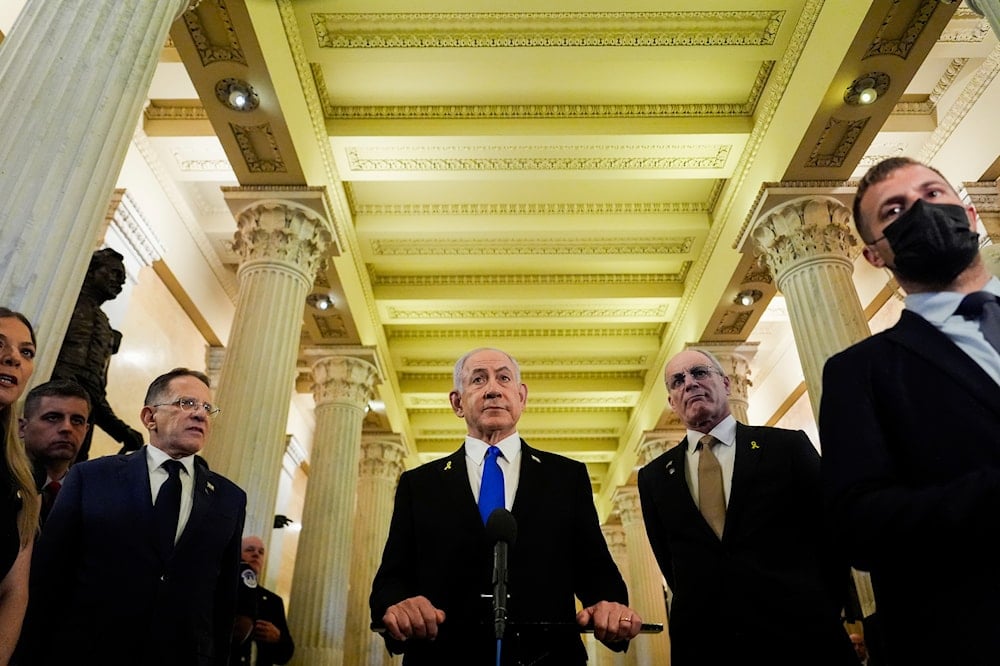Netanyahu meets Trump for second meeting to discuss Gaza ceasefire
Israeli PM Netanyahu meets Trump in Washington as the US pushes for a 60-day Gaza ceasefire tied to normalization talks with Arab states, despite ongoing arms support and mounting global outrage over "Israel's" war on Gaza.
-

Israeli Prime Minister Benjamin Netanyahu speaks to reporters at the US Capitol following a meeting with House Speaker Mike Johnson, R-La., on July 8, 2025, in Washington. (AP Photo/Julia Demaree Nikhinson)
Israeli Prime Minister Benjamin Netanyahu returned to the White House on Tuesday evening for closed-door talks with US President Donald Trump, as Washington looks to contain the political fallout from "Israel's" ongoing war on Gaza, a war the United States has enabled through relentless arms shipments, diplomatic shielding, and rhetorical cover.
Trump told his Cabinet that the meeting would focus "almost exclusively" on Gaza, but sources close to the talks say the real thrust of US diplomacy is to secure a 60-day truce, paired with a limited captives release, as part of a larger effort to revive normalization talks between "Israel" and Arab states, especially the UAE and Saudi Arabia.
Netanyahu, who has long resisted such a pause, suddenly described the US proposal as "a good offer," a shift that comes just days after the UAE hosted Yair Lapid, Netanyahu's main political rival. That move was widely interpreted as a rebuke to Netanyahu and a signal that the Emirates, once key to the normalization agreements, are exploring post-Netanyahu options for regional engagement.
Experts note that by entertaining the US ceasefire plan, Netanyahu is likely aiming to regain Gulf trust, reassure Trump of his utility, and prevent his isolation from deepening in the Arab world.
Read more: Palestine rejects recognition-for-normalization scheme at UN
Despite surging international condemnation, the US has not wavered in its material support for "Israel," funneling billions in weapons and obstructing ceasefire resolutions at the UN. Meanwhile, Gaza lies in ruins: hospitals bombed, schools flattened, entire families buried under rubble.
Palestinian resistance factions and human rights observers argue that a temporary truce without a full withdrawal or political resolution only reinforces impunity and paves the way for further ethnic cleansing.
Diplomacy through devastation
During the same Cabinet meeting, Trump criticized Vladimir Putin over Ukraine, claiming he was "not happy" with the Russian leader and open to more sanctions.
Trump also used the opportunity to promote his recent domestic wins, including tariffs on foreign imports and a sweeping immigration bill, while Netanyahu reportedly nominated him for a Nobel Peace Prize.
For many observers, that gesture encapsulates the moral vacuum of current diplomacy: a US administration framing itself as a peacemaker while underwriting one of the bloodiest military campaigns of the 21st century.
Read more: 'Condemn Israel or be complicit in genocide': Colombia's Gustavo Petro
Earlier today, US envoy Steve Witkoff stated that negotiations over Gaza have reached a point of convergence, noting that there were four key issues at the start, but now only one remains.
Witkoff expressed hope that by the end of the week, an agreement could be finalized that would establish a 60-day ceasefire, adding that the deal includes the release of 10 living Israeli captives and the return of nine bodies throughout the 60 days.

 3 Min Read
3 Min Read










